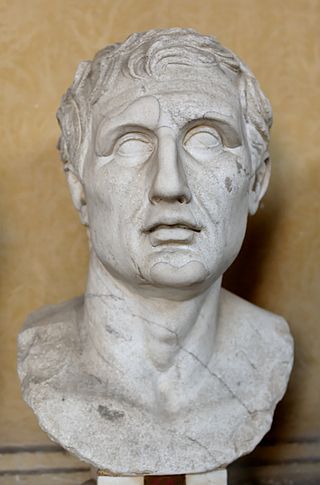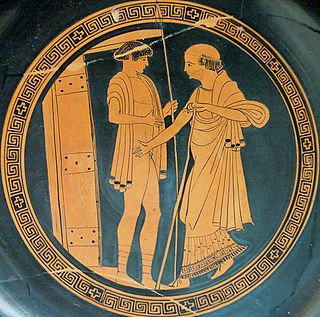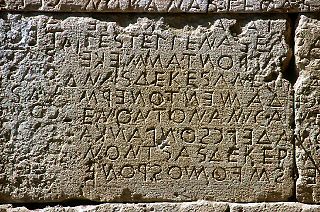
Sappho was an Archaic Greek poet from Eresos or Mytilene on the island of Lesbos. Sappho is known for her lyric poetry, written to be sung while accompanied by music. In ancient times, Sappho was widely regarded as one of the greatest lyric poets and was given names such as the "Tenth Muse" and "The Poetess". Most of Sappho's poetry is now lost, and what is extant has mostly survived in fragmentary form; only the Ode to Aphrodite is certainly complete. As well as lyric poetry, ancient commentators claimed that Sappho wrote elegiac and iambic poetry. Three epigrams formerly attributed to Sappho are extant, but these are actually Hellenistic imitations of Sappho's style.

Menander was a Greek dramatist and the best-known representative of Athenian New Comedy. He wrote 108 comedies and took the prize at the Lenaia festival eight times. His record at the City Dionysia is unknown.

The Achilleis is a lost trilogy by the Athenian dramatist Aeschylus. The three plays that make up the Achilleis exist today only in fragments, but aspects of their overall content can be reconstructed with reasonable certainty. Like the Oresteia which forms "a narratively connected unit with a continuous plot," the trilogy had a unified focus, presumably treating the story of Achilles at Troy in a version comparable to the plot of the latter two-thirds of the Iliad. In the Myrmidons, Achilles' refusal to fight after his quarrel with Agamemnon led to the death of Patroclus. The title of the play traditionally placed second in the trilogy is the Nereids. The chorus was thus a group of Nereids, and the subject of the play involved Achilles and his Nereid mother Thetis, probably her mourning his imminent death and the acquisition of his new arms. In the Phrygians or Ransom of Hector, Priam and a chorus of Phrygians sought to retrieve Hector's body from the still wroth Achilles.

Ancient Greek comedy was one of the final three principal dramatic forms in the theatre of classical Greece. Athenian comedy is conventionally divided into three periods: Old Comedy, Middle Comedy, and New Comedy. Old Comedy survives today largely in the form of the eleven surviving plays of Aristophanes; Middle Comedy is largely lost, i.e. preserved only in relatively short fragments by authors such as Athenaeus of Naucratis; and New Comedy is known primarily from the substantial papyrus fragments of Menander.
Dyskolos is an Ancient Greek comedy by Menander, the only one of his plays, and of the whole New Comedy, that has survived in nearly complete form. It was first presented at the Lenaian festival in Athens in 316 BC, where it won Menander the first prize.

Mabel Louise Lang was an American archaeologist and scholar of Classical Greek and Mycenaean culture.

Dorothy Burr Thompson was an American classical archaeologist and art historian at Bryn Mawr College and a leading authority on Hellenistic terracotta figurines.
Cornelius Clarkson Vermeule III was an American scholar of ancient art and curator of classical art at the Museum of Fine Arts, Boston, from 1957 to 1996. He was also well known as a numismatist. He also used the pseudonyms Wentworth Bunsen, Isao Tsukinabe and Northwold Nuffler.

An epikleros was an heiress in ancient Athens and other ancient Greek city states, specifically a daughter of a man who had no sons. In Sparta, they were called patrouchoi (πατροῦχοι), as they were in Gortyn. Athenian women were not allowed to hold property in their own name; in order to keep her father's property in the family, an epikleros was required to marry her father's nearest male relative. Even if a woman was already married, evidence suggests that she was required to divorce her spouse to marry that relative. Spartan women were allowed to hold property in their own right, and so Spartan heiresses were subject to less restrictive rules. Evidence from other city-states is more fragmentary, mainly coming from the city-states of Gortyn and Rhegium.

The Oxyrhynchus Papyri are a group of manuscripts discovered during the late nineteenth and early twentieth centuries by papyrologists Bernard Pyne Grenfell and Arthur Surridge Hunt at an ancient rubbish dump near Oxyrhynchus in Egypt.
The Cairo Codex is a manuscript discovered in 1907 that contained the first significant fragments of plays by the ancient Greek playwright Menander, including parts of Epitrepontes, Perikeiromene and Samia.

The study of the lives of women in classical Athens has been a significant part of classical scholarship since the 1970s. The knowledge of Athenian women's lives comes from a variety of ancient sources. Much of it is literary evidence, primarily from tragedy, comedy, and oratory; supplemented with archaeological sources such as epigraphy and pottery. All of these sources were created by—and mostly for—men: there is no surviving ancient testimony by Classical Athenian women on their own lives.

Samia, translated as The Girl From Samos, or The Marriage Connection, is an ancient Greek comedy by Menander, who lived from C. 341/2 - c. 290 BCE. It is the dramatist's second most extant play with up to 116 lines missing compared to Dyskolos’s 39. The date of its first performance is unknown, with 315 B.C. and 309 B.C. being two suggested dates. The surviving text of Samia comes from the Cairo Codex found in 1907 and the Bodmer Papyri from 1952.

Aspis is a comedy by Menander that is only partially preserved on papyrus. Of a total of ca. 870 lines, about 420 lines survive, including almost all of the first and second act and the beginning of the third act. It is unknown when and at which festival the play was first performed.

Mary Hamilton Swindler was an American archaeologist, classical art scholar, author, and professor of classical archaeology, most notably at Bryn Mawr College, the University of Pennsylvania, and the University of Michigan. Swindler also founded the Ella Riegel Memorial Museum at Bryn Mawr College. She participated in various archaeological excavations in Greece, Egypt, and Turkey. The recipient of several awards and honors for her research, Swindler's seminal work was Ancient Painting, from the Earliest Times to the Period of Christian Art (1929).

Sikyonios or Sikyonioi, translated as The Sicyonian(s) or The Man from Sicyon, is an Ancient Greek comedy by Menander. About half of the play has survived in fragments of papyrus used to stuff several mummies in the cemetery of Medinet-el-Ghoran in the Faiyum, where they were discovered in 1901 by Pierre Jouguet. The first acts are almost completely lost, but the rest, although the manuscript is often corrupt, lacunose and hard to read, allows a fair reconstruction of the plot.
Barbara Elizabeth Goff is a Classics Professor at the University of Reading. She specialises in Greek tragedy and its reception; women in antiquity; postcolonial classics and reception of Greek political thought.
Carol Margaret Handley is a British former headmistress of Camden School for Girls (1971–1985) and president of the Classical Association (1996–1997). Handley is now a classics tutor at Wolfson College, Cambridge. Handley is known for her longstanding advocacy for Classics education in schools and universities, as well as for her work on teaching and examination materials for the Joint Association of Classical Teachers and for the University of Cambridge.
Sheila Louise Ager is a Canadian Lecturer and the Director of Hellenistic Studies at the University of Waterloo, Ontario. Her principal area of interest is Greek history, focusing on the Hellenistic Age, from 323 BC to 30 BC. She has further interest in interstate relations in the Hellenistic Period, and much of her work centres on the concept of peaceful resolution of disputes. She also researches the Ptolemaic dynasty, especially its final ruler, Cleopatra VII.
Allison Glazebrook is Professor of Greek Social and Cultural History, Gender and Sexuality, and Greek Oratory at Brock University. She was President of the Classical Association of Canada 2018–20.













